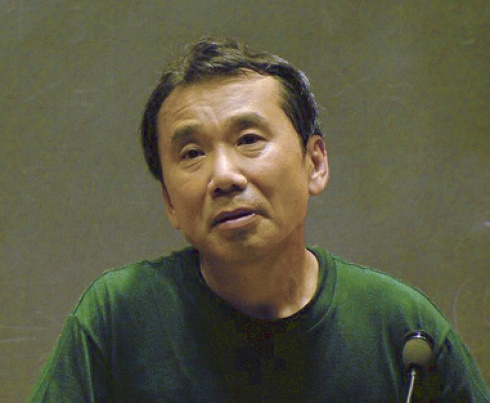
Last month we featured the particulars of novelist Haruki Murakami’s passion for jazz, including a big Youtube playlist of songs selected from Portrait in Jazz, his book of essays on the music. But we also alluded to Murakami’s admission of running to a soundtrack provided by The Lovin’ Spoonful, which suggests listening habits not enslaved to purism. His books — one of the very best known of which takes its name straight from a Beatles song (“Norwegian Wood”) — tend to come pre-loaded with references to several varieties of music, almost always Western and usually American. “The Fierce Imagination of Haruki Murakami,” Sam Anderson’s profile of the writer on the occasion of the release of his previous novel 1Q84, name-checks not just Stan Getz but Janáček’s Sinfonietta, The Rolling Stones’ Sympathy for the Devil, Eric Clapton’s Reptile, Bruce Springsteen’s version of “Old Dan Tucker,” and The Many Sides of Gene Pitney. The title of Murakami’s new Colorless Tsukuru Tazaki and His Years of Pilgrimage, writes The Week’s Scott Meslow, references Franz Liszt’s ‘Years of Pilgrimage’ suite, “which plays a central role in the novel’s narrative. The pointed reference isn’t exactly a major detour from Murakami.”
Given the writer’s increasing reliance on music and the notion of “songs that literally have the power to change the world,” to say nothing of his “ability to single-handedly drive musical trends,” it can prove an illuminating exercise to assemble Murakami playlists. Selecting 96 tracks, Meslow has created his own playlist (above) that emphasizes the breadth of genre in the music incorporated into Murakami’s fiction: from Ray Charles to Brenda Lee, Duke Ellington to Bobby Darin, Glenn Gould to the Beach Boys. Each song appears in one of Murakami’s novels, and Meslow even includes citations for each track: “I had some coffee while listening to Maynard Ferguson’s ‘Star Wars.’ ” “Her milk was on the house if she would play the Beatles’ ‘Here Comes the Sun,’ said the girl.” “Imagine The Greatest Hits of Bobby Darin minus ‘Mack the Knife.’ That’s what my life would be like without you.” “The room begins to darken. In the deepening darkness, ‘I Can’t Go For That’ continues to play.” It all coheres in something to listen to while exploring Murakami’s world: in your imagination, in real life, or in his trademark realms between.
To listen to the playlist above, you will first need to download Spotify. Please note that once you mouse over the playlist, you can scroll through all 96 songs. Look for the vertical scrollbar along the right side of the playlist.
Photo above is attributed to “wakarimasita of Flickr”
Related Content:
Read 5 Stories By Haruki Murakami Free Online (For a Limited Time)
A Photographic Tour of Haruki Murakami’s Tokyo, Where Dream, Memory, and Reality Meet
Haruki Murakami’s Passion for Jazz: Discover the Novelist’s Jazz Playlist, Jazz Essay & Jazz Bar
In Search of Haruki Murakami, Japan’s Great Postmodernist Novelist
Haruki Murakami Translates The Great Gatsby, the Novel That Influenced Him Most
Colin Marshall hosts and produces Notebook on Cities and Culture and writes essays on cities, language, Asia, and men’s style. He’s at work on a book about Los Angeles, A Los Angeles Primer. Follow him on Twitter at @colinmarshall or on Facebook.


I sold him a few jazz records on eBay a while back. Some Big Band stuff, if I remember correctly. I knew it was him because the address was in Hawaii and, obviously, the recipient was Haruki Murakami.
Hi, if you want to explore other Haruki’s music come and visit: http://haruki-music.com
Is it possible to list tracks title in text format for those in whose countries Sporify player is not available?
Thanks!
This playlist is missing some things…
What about the Prince, Radiohead, and Lovin’ Spoonful mentioned in Kafka By The Shore listened to on a mini disc player ? That’s just off the top of my head…
Have a great read with music from Norwegian Wood http://spoti.fi/21mnC1u
i hope you guys will enjoy. i made these playlists totally for myself, but saw a community that equally enjoys this.
here is a playlist made from 1Q84 : https://play.spotify.com/user/purevibes/playlist/45kfTnYKP3Vb4Ok0454oUf
and this link takes you to Norwegian Wood: http://spoti.fi/21mnC1u
have a great read. cheers!!
Great list, but how about Up on the Roof by The Drifters (mentioned in Norwegian Wood!)?? :)
Not very impressed. You didn’t even put any songs from the albums Daydream or Hums of The Lovin’ Spoonful by The Lovin’ Spoonful. The playlist seems pretty generic and basic. It could be deeper!!
Helpful instructions! It’s good to know I need Spotify to access the playlist, and the scrolling tip makes it easier to browse through all the songs. Thanks for the guidance!